|
|
|
Sort Order |
|
|
|
Items / Page
|
|
|
|
|
|
|
| Srl | Item |
| 1 |
ID:
117981
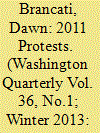

|
|
|
|
|
| Publication |
2013.
|
| Summary/Abstract |
In 2011, throngs of protesters took to the streets, often at great risk to their lives, to challenge the results of undemocratic elections across the globe-in Bahrain, Benin, Egypt, Haiti, Morocco, Nicaragua, Nigeria, and Russia. Outside of elections, pro-democracy protests also took place in 2011 in Cameroon, Libya, Malaysia, Swaziland, Syria, Tunisia, and Yemen, among other countries.
|
|
|
|
|
|
|
|
|
|
|
|
|
|
|
|
| 2 |
ID:
117988
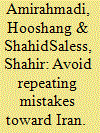

|
|
|
|
|
| Publication |
2013.
|
| Summary/Abstract |
The United States and Iran have been locked in a historically rare relationship: Washington and Tehran have not been able to talk to each other in a meaningful and consistent way. This pattern was not seen even during the Cold War between the United States and its communist adversaries. If the factors which have perpetuated this state of non-communication (or failing engagement) continue to go ignored, it is unreasonable to expect a negotiated solution in the coming months or years. This essay seeks to answer three questions: First, why have Iran and the United States been unable to engage in sustained dialogue aimed at détente and minimal cooperation? Second, why will current U.S. policies toward Iran's nuclear program likely fail, leading to a war that would make Iran weaponize? Third, what strategies and policies should be implemented to end the standoff over Iran's nuclear program, and facilitate détente between the two countries?
|
|
|
|
|
|
|
|
|
|
|
|
|
|
|
|
| 3 |
ID:
117985


|
|
|
|
|
| Publication |
2013.
|
| Summary/Abstract |
The rise of four powerful democracies-Brazil, India, Indonesia, and Turkey-presents one of the most significant opportunities for U.S. foreign policy in the early 21st century. The democracies that have newly emerged on the global stage collectively possess the capability and the legitimacy to bolster the interlocking web of norms, institutions, rules, and relationships that has for six decades preserved peace among the great powers, fostered economic prosperity, and facilitated the spread of freedom. This global order now confronts numerous challenges, some emanating from China's rise and others from a diverse set of international developments. If these challenges eventually fragment the international order, the United States, its allies, and all other countries that depend upon an open and stable world will suffer the consequences.
|
|
|
|
|
|
|
|
|
|
|
|
|
|
|
|
| 4 |
ID:
117986


|
|
|
|
|
| Publication |
2013.
|
| Summary/Abstract |
Mobile telephones are revolutionizing politics and driving political change throughout the developing world. Nothing is so powerful, so transformative. Mobile telephone technology has already changed how people in the developing world cope with their political, economic, and social circumstances. Now, through its ability interactively to transmit verbal and visual (photos or video) information by voice and/or text messaging, mobile telephone technology is poised dramatically to improve human outcomes and life choices for many millions across the globe's weak and failed states. No other recently-introduced technology has been so widely embraced or has so much potential to alter rural and urban outcomes for the better in Africa, Asia, Latin America, and elsewhere.
|
|
|
|
|
|
|
|
|
|
|
|
|
|
|
|
| 5 |
ID:
117987
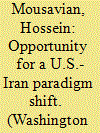

|
|
|
|
|
| Publication |
2013.
|
| Summary/Abstract |
The Arab region today is drenched in chaos and instability: Palestine is bleeding, Iraq burning, Syria erupting, Persian Gulf oil countries are trembling, Lebanon simmering, Afghanistan devastated, and Iran under adversarial focus. An array of unaddressed historical grievances and unresolved disputes add to this chaos. Starting with Tunisia last year, the Arab Street has virtually been under popular siege to break away from long-brewing political morbidity and authoritarian culture.
|
|
|
|
|
|
|
|
|
|
|
|
|
|
|
|
| 6 |
ID:
117980
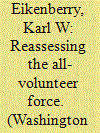

|
|
|
| 7 |
ID:
117984


|
|
|
|
|
| Publication |
2013.
|
| Summary/Abstract |
In today's interconnected world, the United States needs partners to help bolster the global economy, prevent the spread of nuclear weapons, stem climate change, alleviate poverty, and destroy terrorist networks. U.S. peace and prosperity very often hinge on getting other countries to step up. This has led the Obama administration to pursue a strategy-call it the "responsibility doctrine"-of prodding other influential nations (especially the pivotal BRICS countries of Brazil, Russia, India, China, and South Africa) to help shoulder the burden of fostering a stable, peaceful world order that delivers security and prosperity.1 With a more concerted and systematic push than widely recognized, the Obama administration has sought contributions from other nations to help address an extensive range of global challenges. Through incentives, cajoling, and coercion, it has made the pursuit of American-led collective action a hallmark of its foreign policy.
|
|
|
|
|
|
|
|
|
|
|
|
|
|
|
|
| 8 |
ID:
117983


|
|
|
|
|
| Publication |
2013.
|
| Summary/Abstract |
Having crushed the al-Qaeda leadership, the United States and its NATO allies should exit Afghanistan without leaving behind the kind of instability that prompted their intervention in the first place. No other sub-region of the world contains such a dangerous intersection of radical ideologies, clashing interests, and regional nuclear arsenals. Further proliferation, lucrative drug corridors, and exploitable mineral wealth will make future Afghan conflicts more dangerous than ever. Yet under our current approach, the United States is failing to protect its interests as it withdraws from Afghan territory and the neighbors prepare to pounce. Although it defies current practice, the United States urgently needs not short-term but long-term thinking. Washington must craft a lasting political strategy for managing Afghanistan and the region from afar.
|
|
|
|
|
|
|
|
|
|
|
|
|
|
|
|
| 9 |
ID:
117989


|
|
|
|
|
| Publication |
2013.
|
| Summary/Abstract |
Complex and often contradictory interactions among Turkey, Russia, and Iran are shaping regional dynamics in the Middle East, Caucasus, and Central Asia. The nexus of the three pairs of relations are influencing each country's dealings with the other two, as well as with the United States, and are whipsawed by events on the ground that continue to surprise leaders of these three historic rivals. Starkly differing policies toward the Syrian civil war and the Arab Awakening have strained Ankara's previously cooperative relations with Moscow and Tehran.
|
|
|
|
|
|
|
|
|
|
|
|
|
|
|
|
| 10 |
ID:
117982
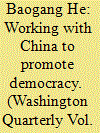

|
|
|
|
|
| Publication |
2013.
|
| Summary/Abstract |
China represents an uncomfortable thorn in U.S. efforts to promote democracy around the world. While some projects have been successful, a large gap exists between the increasing U.S. funding in China and its "limited impact."1 Moreover, U.S. democracy promotion in China has contributed to strategic distrust between China and the United States; Beijing perceives it as a strategic move to destabilize the rise of China and sabotage the Communist Party's leadership.2 At the same time, China's growing power while maintaining one-party rule and rejecting democratic change generates fear and distrust among many Americans.
|
|
|
|
|
|
|
|
|
|
|
|
|
|
|
|
|
|
|
|
|